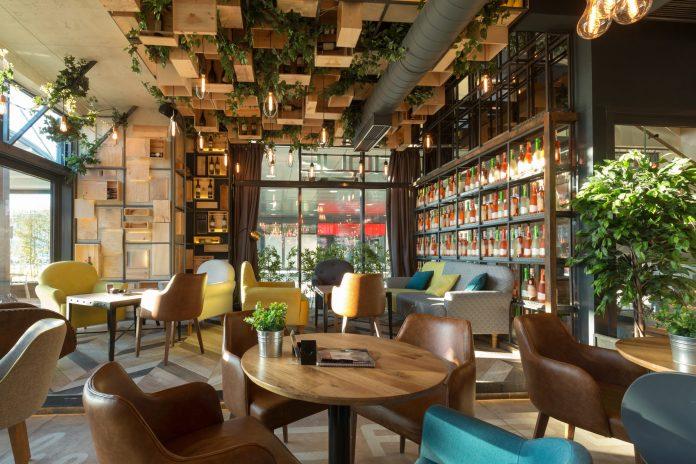Beyond traditional dining settings, innovative restaurateurs are pushing boundaries, creating immersive experiences that captivate diners. Let’s explore some of the most intriguing and successful unique restaurant concepts and ideas that go beyond the ordinary.
1. Underwater Dining
Imagine dining in a world beneath the waves, surrounded by marine life and the serenity of the ocean. Underwater dining concepts have gained popularity in recent years, offering an unparalleled experience where guests can enjoy gourmet meals while immersed in an underwater spectacle. These restaurants, often featuring transparent walls, provide a surreal dining environment, making it an unforgettable journey into the depths.
2. Dark Dining
Dark dining, also known as blind dining, takes guests on a sensory adventure by eliminating the sense of sight. Diners experience a meal in complete darkness, relying on taste, touch, smell, and sound to navigate the culinary offerings. This concept enhances the appreciation of flavors and textures, turning every bite into a mystery waiting to be unraveled.
3. Vertical Farm-to-Table
The farm-to-table concept takes a vertical twist by integrating agriculture into the dining experience. Vertical farms, often located on the premises, supply fresh produce directly to the kitchen. Diners can enjoy the unique experience of dining amidst thriving crops, witnessing the journey of ingredients from farm to plate. This sustainable approach not only ensures freshness but also creates an immersive connection with nature.
4. Culinary Artistry
For those who appreciate the intersection of food and art, culinary artistry restaurants provide a visual feast alongside their culinary offerings. These establishments often showcase rotating art installations, allowing diners to enjoy both the aesthetic beauty of the surroundings and the artistic presentation of their meals. It’s a multisensory experience where every dish is a work of art.
5. Interactive Dining
Interactive dining brings the kitchen to the forefront, offering guests a front-row seat to the culinary action. In these concepts, diners sit at an interactive chef’s table, where they can witness the chefs’ creativity, techniques, and precision up close. The experience becomes a dialogue between the culinary artists and the guests, fostering a deeper appreciation for the craftsmanship behind each dish.
6. Pop-Up Restaurants
Pop-up restaurants bring an element of surprise and transience to the dining scene. These temporary establishments often appear in unexpected locations, providing a unique experience for adventurous diners. From hidden rooftops to unconventional spaces, pop-up restaurants offer a sense of exclusivity and excitement, with ever-changing themes and menus.
FAQs
1. What defines a unique restaurant concept?
A unique restaurant concept is characterized by innovative and unconventional approaches to dining. It goes beyond traditional themes, offering distinct and memorable experiences that set it apart from mainstream restaurants.
2. How important is the ambiance in a unique restaurant concept?
Ambiance plays a crucial role in unique restaurant concepts. The atmosphere is carefully curated to complement the theme and enhance the overall dining experience, creating a cohesive and immersive environment.
3. Are unique restaurant concepts limited to fine dining establishments?
No, unique restaurant concepts can span across various dining categories, including casual dining, fast-casual, and even food trucks. The key is in the creativity and originality of the concept rather than the formality of the dining setting.
4. Do unique restaurant concepts prioritize sustainability?
Many unique restaurant concepts today incorporate sustainability as a key element. From eco-friendly practices in sourcing ingredients to implementing green design and energy-efficient technologies, sustainability aligns with the innovative spirit of these concepts.
5. Are unique restaurant concepts more focused on the visual experience or the culinary aspect?
The best unique restaurant concepts strike a balance between visual aesthetics and culinary excellence. While the visual experience is crucial for creating a memorable atmosphere, the quality and creativity of the food remain paramount to overall success.
6. Can unique restaurant concepts cater to specific dietary preferences or restrictions?
Yes, many unique restaurant concepts are adaptable to cater to various dietary preferences, including vegetarian, vegan, gluten-free, and other restrictions. The focus is on inclusivity, ensuring a diverse range of patrons can enjoy the unique offerings.
7. How do unique restaurant concepts stay relevant in a dynamic market?
Staying relevant involves a commitment to continuous innovation. Successful unique restaurant concepts evolve with changing consumer preferences, incorporating new trends, technologies, and culinary techniques to keep their offerings fresh and exciting.
8. Are immersive experiences a common feature in unique restaurant ideas?
Yes, immersive experiences are often a hallmark of unique restaurant concepts. This can include interactive elements, themed decor, live performances, or any other aspect that engages multiple senses, providing a unique and memorable journey for diners.
9. Can unique restaurant ideas and concepts be replicated, or are they one-of-a-kind establishments?
While some unique concepts are designed as one-of-a-kind experiences, others may have the potential for replication or franchising. However, maintaining the original essence and quality across multiple locations can be a challenge.
10. How can aspiring restaurateurs develop their unique restaurant concept?
Developing a unique restaurant concept involves a combination of creativity, market research, and a deep understanding of the target audience. Collaborating with experienced professionals, such as chefs, designers, and marketers, can contribute to the success of the concept.
Conclusion
In the realm of unique restaurant concepts, the boundaries of traditional dining are continually expanding. These innovative approaches not only redefine the culinary landscape but also offer diners an opportunity to engage with food in novel and exciting ways. As the restaurant industry evolves, these unique concepts pave the way for a future where dining is not just a necessity but a journey of exploration and delight.
